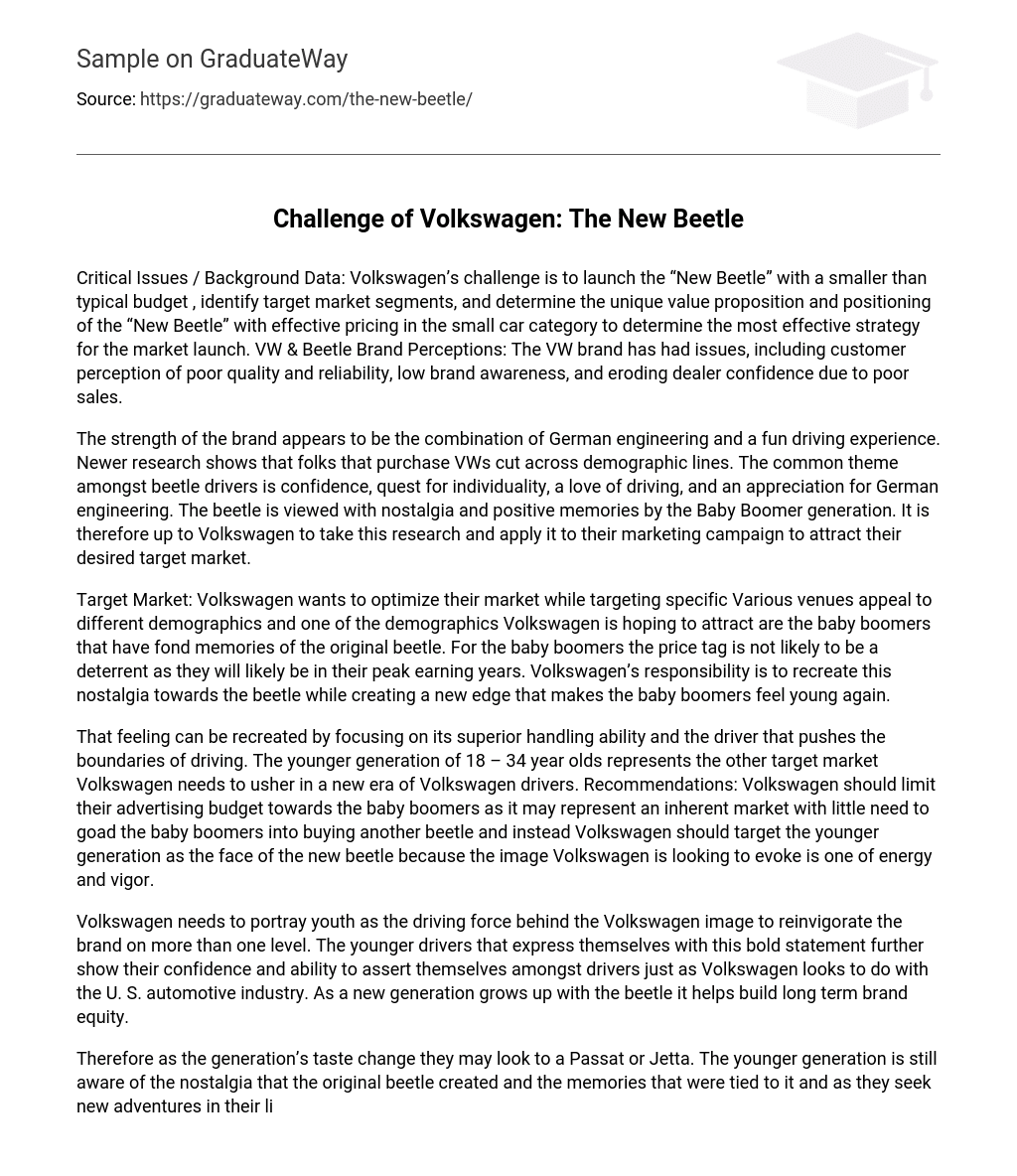Critical Issues / Background Data: Volkswagen faces the challenge of launching the “New Beetle” on a limited budget. They also need to identify target market segments and define the unique value proposition and positioning of the “New Beetle” in the small car category, while setting appropriate pricing. This will help determine the most effective strategy for the market launch.
VW & Beetle Brand Perceptions: The VW brand has been struggling with issues such as poor customer perception of quality and reliability. Additionally, there is low brand awareness and dealer confidence has been eroding due to weak sales.
The brand’s strength seems to lie in the blend of German engineering and an enjoyable driving experience. Recent studies indicate that people who buy VWs come from various demographics. The key shared traits among Beetle drivers include confidence, a desire for individuality, a passion for driving, and an admiration for German engineering. For Baby Boomers, the Beetle evokes nostalgia and elicits positive memories. VW must utilize this research to shape their marketing strategy and appeal to their target market effectively.
Target Market: Volkswagen aims to optimize their market by targeting specific demographics. Various venues appeal to different demographics, and one demographic that Volkswagen hopes to attract are the baby boomers who have nostalgic memories of the original beetle. The price tag is not likely to deter baby boomers, as they are likely to be in their peak earning years. Volkswagen’s responsibility is to both recreate the nostalgia of the beetle for baby boomers and create a new edge that makes them feel youthful once again.
That feeling can be recreated by focusing on the superior handling ability of the car and the driver who pushes the boundaries of driving. Volkswagen needs to target the younger generation of 18 – 34 year olds to bring in a new era of Volkswagen drivers. Recommendations: Volkswagen should allocate a restricted advertising budget to attract baby boomers, as they may already be a natural market and not require persuasion to buy another beetle. Instead, Volkswagen should focus on the younger generation as the embodiment of the new beetle, as the desired image is one of energy and enthusiasm.
Volkswagen aims to rejuvenate the brand by emphasizing the role of youth as the driving force behind its image. By expressing themselves and making a bold statement, young drivers showcase their confidence and ability to assert themselves, mirroring Volkswagen’s ambition of standing out in the U.S. automotive industry. As a new generation grows up with the Beetle, it contributes to the development of lasting brand equity.
Therefore, as the taste of the generation changes, they may consider a Passat or Jetta. However, the younger generation still remembers the nostalgia and memories associated with the original beetle. As they embark on new adventures in life, the beetle also offers them the same opportunity. In order to achieve growth, Volkswagen needs to focus on targeting the 18 – 34 year old demographic. The next challenge for Volkswagen is figuring out how to effectively reach this demographic.
Due to its limited budget, Volkswagen is forced to explore more innovative approaches to generate widespread excitement quickly. Television is known as the fastest method to achieve product awareness. Therefore, initially targeting specific timings and programs that appeal to the target demographic might be necessary to rapidly penetrate the market. Once awareness is established, Volkswagen can enlist salespeople at dealerships to drive test cars near locations frequented by college students and young professionals.
Using this approach would be a cost-effective strategy to promote the new beetle and spark the interest of potential customers. Volkswagen could leverage television advertising to highlight the advantages of the car and attract a younger demographic to their showrooms.





